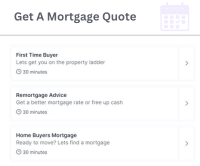First time buyers mortgage
Find a mortgage to buy your first home
Buying your first home can feel like a daunting task and it's easy to feel overwhelmed. However, with the right guidance, you can make the right decisions and secure a home that suits your budget.
- Rated as excellent
- 4.98/5
YOUR HOME OR PROPERTY MAY BE REPOSSESSED IF YOU DO NOT KEEP UP REPAYMENTS ON YOUR MORTGAGE.
Why choose us
We help to buy your first home
Focus on the excitement of moving into your first home and let us handle the mortgage search, application, and everything in between.
Save Time
Don’t waste your valuable time researching mortgage rates and completing lengthy application forms. We’ll take care of it for you.
Save Money
Save money on your mortgage with better rates and lower application fees, it could mean big savings on your monthly payments.
Get Exclusive Rates
Your mortgage adviser has access to 1000’s of mortgage rates and exclusive offers that that may not be available to you directly.
Mortgage declined?
Cant get a mortgage?
You're not alone, many people are declined a mortgage every day. Bad credit, low mortgage deposit, recent divorce, immigration status, or just feeling overwhelmed by all the options? We understand, and we're here to help
Many people struggle to secure a mortgage due to factors like poor credit history, insufficient savings, or a lack of understanding about the mortgage application process. These challenges can make it difficult to achieve the dream of buying your first home.
Not being able to get a mortgage can be really frustrating and stressful. It can make you feel financially insecure and hold back important life plans. It’s totally understandable to feel disappointed or discouraged in this situation.
If your worried about bad credit or low mortgage deposit, we’re here to help. You’ll get personalised advice and exclusive mortgage rates to find the right mortgage for your unique situation. We’ll make sure you qualify and can comfortably afford your payments, so you can have focus on the excitement of buying your first home.
Find a mortgage
Need help finding your first mortgage, or have questions about how to get a mortgage? Book your no-obligation chat today to get personalised mortgage advice.
Confused about mortgages
Mortgage rates and everything else
From the initial deposit to securing the right interest rate, it's easy to feel overwhelmed. Let's break down some essential steps to help you navigate this exciting journey.
Fixed-rate mortgages
When you get a fixed-rate mortgage, your monthly payments will remain the same no matter what happens with interest rates. There are various fixed-rate periods, including 2, 3, and 5 years.
Tracker mortgages
As the Bank of England’s Base Rate rises or falls, tracker mortgages follow it. An agreed margin is added to the Bank of England’s Base Rate to calculate the interest rate. A ‘lifetime’ tracker is for the life of the mortgage, and a ‘term’ tracker is for a period of two or three years.
Standard variable rate mortgages
A SVR is the rate of interest charged once a fixed rate or term tracker period ends. Instead of switching to a SVR, you can usually move to another fixed or tracker product..
A mortgage commonly comes with two payment options, capital repayment and interest-only. It is imperative to carefully consider these options.
What is a capital repayment mortgage?
A capital repayment mortgage includes both capital repayments and interest payments each month. If you use this repayment method, your mortgage will be fully repaid at the end of the term.
What is an interest-only mortgage?
When you have an interest-only mortgage, your monthly payment covers only the interest on your loan, so your capital debt doesn’t decrease over time. Lenders will want to see evidence that you will be able to repay the debt in the future. Buying to let is often done with an interest-only mortgage.
What is it?
A first time buyer mortgage is a loan for people who've never owned a home before. These mortgages often have lower deposits, better interest rates, and sometimes even government help to make buying your first home easier.

Mortgage deposit
Aim to save at least a 5% deposit, but ideally more, to reduce the interest rate. Consider government schemes like the First Home Scheme or Help to Buy if you need help.

Credit score
A good credit score can really impact your mortgage interest rate. Review your credit report and address any negative items.

Calculate budget
Determine how much you can comfortably afford to spend on a mortgage, including the deposit, repayments, and potential additional costs like stamp duty and legal fees.

for first time home buyers
Can I get a mortgage
Our experienced first time buyer mortgage advisers help real people. real reviews navigate the home-buying process. We'll help you:
-
Find the right mortgage Discover exclusive mortgage rates and personalized advice tailored to your unique financial situation.
-
Simplify the process Let us handle the paperwork and negotiations, so you can focus on the more exciting things in life.
-
Ensure mortgage affordability: We'll make sure you qualify for a mortgage you can comfortably afford, giving you peace of mind.


how to get a mortgage
Take the first step
Advice whenever you need it
Get expert mortgage advice, from 8am - 8pm Monday to Friday & 9am - 6:30pm on Saturday & Sunday.
first time buyer help
Your mortgage questions
Lower interest rates: First-time buyer mortgages typically have lower interest rates than other types of mortgages. This can save you money on your monthly payments.
More flexible terms: First-time buyer mortgages often have more flexible terms than other types of mortgages. For example, you may be able to choose a shorter term or a lower deposit.
Government schemes: There are a number of government schemes available to help first-time buyers, such as the help to buy scheme or the save to buy scheme.
Your GHL Direct mortgage adviser can guide you through the entire process and search first time buyer mortgage deals on your behalf.
To be eligible for a mortgage as a first-time buyer, you will typically need to meet the following criteria:
Be a first-time buyer: You must not have owned a property in the past.
Be a UK resident: You must be a UK resident and have a permanent UK address.
Have a good credit history: You must have a good credit history and be able to demonstrate that you can manage your finances responsibly.
Mortgage deposit: You will need to have a deposit of at least 5% of the purchase price of the property.
Here are some questions you can ask your mortgage adviser:
- How much can I borrow?
- What type of mortgage is best for me?
- What are the interest rates and fees?
- What are the monthly repayments?
- What happens if I can’t afford to make my repayments?
- What are the pros and cons of different mortgage products?
Fixed-rate mortgages: With a fixed-rate mortgage, your interest rate will stay the same for the entire term of the mortgage. This can provide peace of mind, as you know exactly what your monthly payments will be. However, if interest rates rise, you will not benefit from the lower rates.
Variable-rate mortgages: With a variable-rate mortgage, your interest rate will fluctuate based on the Bank of England base rate. This means that your monthly payments may go up or down, depending on the market. However, if interest rates fall, you will benefit from the lower rates.
Tracker mortgages: A tracker mortgage is a type of variable-rate mortgage that tracks the Bank of England base rate. This means that your interest rate will always be a certain percentage above the base rate.
Discounted mortgages: A discounted mortgage is a type of variable-rate mortgage that is offered at a discount to the lender’s standard variable rate (SVR). This means that your interest rate will be lower than the SVR, but it may still fluctuate.
First time buyer scheme: Help to Buy: Equity Loan | Shared ownership | The Mortgage Guarantee Scheme
Your first meeting with a GHL Direct mortgage adviser is at no cost to you and doesn't commit you to anything. We'll chat about your mortgage goals and see how we can help.
Just to be upfront, our mortgage advisers might charge a fee based on how complicated your situation is. Some mortgage brokers charge a one-time fee, while others earn a commission from the lender. Your adviser will explain everything clearly before we start
